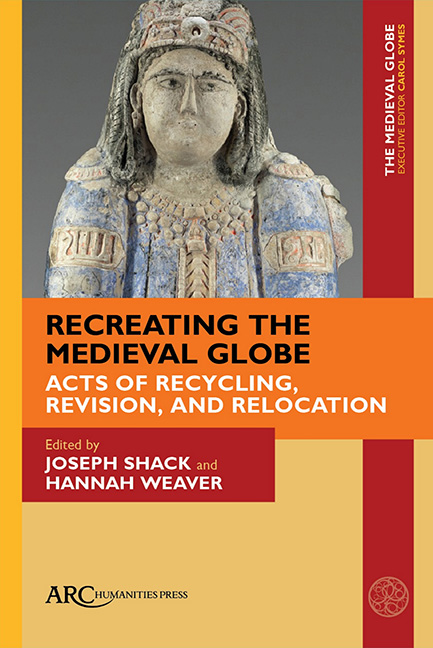Book contents
- Frontmatter
- Contents
- List of Illustrations
- Introduction to Recreating the Medieval Globe: Acts of Recycling, Revision, and Relocation
- Self-Revision and the Arabic Historical Tradition: Identifying Textual Reuse and Reorganization in the Works of al-Balādhurī
- When Curtains Fall: A Shape-Shifting Silk of the Late Abbasid Period
- Salvaging Meaning: The Art of Recycling in Sino-Mongol Quanzhou, ca. 1276–1408
- Recontextualizing Indigenous Knowledge on the Prussian–Lithuanian Frontier, CA. 1380–1410
- Meubles: The Ever Mobile Middle Ages
- Reflection
- Index
Self-Revision and the Arabic Historical Tradition: Identifying Textual Reuse and Reorganization in the Works of al-Balādhurī
Published online by Cambridge University Press: 22 June 2021
- Frontmatter
- Contents
- List of Illustrations
- Introduction to Recreating the Medieval Globe: Acts of Recycling, Revision, and Relocation
- Self-Revision and the Arabic Historical Tradition: Identifying Textual Reuse and Reorganization in the Works of al-Balādhurī
- When Curtains Fall: A Shape-Shifting Silk of the Late Abbasid Period
- Salvaging Meaning: The Art of Recycling in Sino-Mongol Quanzhou, ca. 1276–1408
- Recontextualizing Indigenous Knowledge on the Prussian–Lithuanian Frontier, CA. 1380–1410
- Meubles: The Ever Mobile Middle Ages
- Reflection
- Index
Summary
THE PRE-MODERN ISLAMIC historical and literary tradition is massive, on a scale that many historians of other regions and linguistic traditions may find surprising. To quote the modern scholar of Islam, Josef van Ess: “We have about two million Arabic or Persian manuscripts in the world. There are more than 500,000 in Istanbul alone. Only a small percentage of the texts—perhaps six or seven percent—are known and printed.” Millions of Arabic manuscripts survive in collections—both public and private—around the world; but until recently, the growth in pre-modern Islamic historical studies has been slow in comparison to the activity of our colleagues who work in other branches of global medieval studies. When Van Ess made that original comment in 1973, he also stated his opinion that “Islamic studies are one century behind Latin medieval studies; there are only a few Arabicists.”
Although the landscape of pre-modern Islamic studies and history has certainly changed since then, the core of Van Ess’ comment is worth reflecting upon. In other fields that revolve around the classical and medieval Mediterranean, source criticism and the literary analysis of textual traditions have been ongoing for hundreds of years, as has the editing of corpora in languages such as Greek and Latin. In some cases, this has been aided by the paucity of sources—the surviving collection of ancient Greek texts, for instance, is dwarfed by the massive size of what exists in Persian alone, let alone in other languages such as Arabic and Turkish. And even with the growth of Islamic studies across the world over the last fifty years, there is still a great deal that we have yet to learn about the compilation of these texts and the authors-cum-compilers behind that work.
The study offered here deals with just one small part of the Arabic historical tradition as it developed up to the ninth century CE/third century AH. The corpus of surviving literary material from this period is substantially more limited than the medieval Arabic tradition at large, and for that reason it affords an opportunity to further our understanding of these earliest surviving texts, their authors, and their re-use.
- Type
- Chapter
- Information
- Recreating the Medieval GlobeActs of Recycling, Revision, and Relocation, pp. 9 - 30Publisher: Amsterdam University PressPrint publication year: 2020



